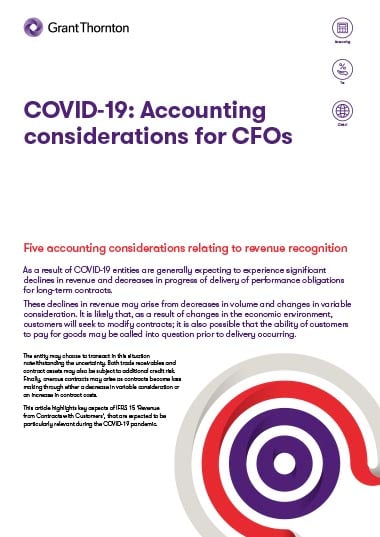-
Sector Focus
We specialise in the investment management industry offering audit, assurance, tax and corporate recovery and liquidation services.
-
Personal Tax Services
There are many tax rules that can affect you personally and therefore which will have an impact on your personal wealth.
-
QI Compliance
Qualified Intermediaries (QI) have to take action now to perform a Certification to the Internal Revenue Service (IRS).
-
Download our tax brochures
The tax teams at Grant Thornton aim to provide the Channel Islands with a premier tax advisory service both to private clients and the business community including the investment management industry.
-
Jersey Tax Return
A secure sign in page to file Jersey Tax Returns through the Grant Thornton tax portal.
-
ESG
ESG can either be seen as a risk management tool or an opportunity, either way it is imperative to your business, whatever your size and whether you are listed or not.
-
Professional Services
Business and accounting support for professional services
-
Finance Industry
We work with a broad range of clients and their financial stakeholders, from entrepreneurs in the early days to fast growing and established businesses to public companies competing in global markets.
-
Local Businesses
Businesses come in many shapes and sizes – from innovative start-ups to long-established local businesses. But however large or small your business, the chances are you face similar challenges.
-
Corporate Insolvency
Our corporate investigation, Guernsey liquidation and recovery teams focus on identifying and resolving issues affecting profitability, protecting enterprise value and facilitating a full recovery where possible.
-
Corporate Simplification
Redundant corporate entities can over complicate group structures and waste thousands of pounds in unnecessary costs each year. 46% of the c.15,500 companies controlled by the FTSE100 are dormant and it is estimated that the average cost of administering dormant companies is between £3,500 and £5,000 per company, per year.
-
Debt Advisory
Our Debt Advisory team provides commercial and financial debt advice to corporate entities and public sector bodies in a range of sectors. Our engagements include advice on stand-alone transactions and solutions or as part of an integrated business plan, in both the project and corporate arenas.
-
Exit Strategy Services
We offer a tailored methodology designed to enable a company to be reviewed in a group context to assess ways to maximise its value.
-
Financial Restructuring
For companies challenged by under-performance we work with management teams, shareholders, lenders and other stakeholders to implement financial restructuring solutions creating a stable platform for business turnaround.
-
Strategic performance reviews
Strategic performance reviews analyse the key drivers of performance improvement. Our specialists utilise a framework to evaluate financial and operational options and to identify solutions for businesses and their stakeholders.
As a result of COVID-19 entities are generally expecting to experience significant declines in revenue and decreases in progress of delivery of performance obligations for long-term contracts. These declines in revenue may arise from decreases in volume and changes in variable consideration. This article highlights key aspects of IFRS 15 ’Revenue from Contracts with Customers’, that are expected to be particularly relevant during the COVID-19 pandemic.
It is likely that, as a result of changes in the economic environment, customers will seek to modify contracts; it is also possible that the ability of customers to pay for goods may be called into question prior to delivery occurring.
The entity may choose to transact in this situation notwithstanding the uncertainty. Both trade receivables and contract assets may also be subject to additional credit risk. Finally, onerous contracts may arise as contracts become loss-making through either a decrease in variable consideration or an increase in contract costs.
1. Applying the ‘5 step model’
IFRS 15 is based on a core principle that requires an entity to recognise revenue in a manner that depicts the transfer of goods or services to customers and at an amount that reflects the consideration the entity expects to be entitled to in exchange for those goods or services. Applying this principle involves following the ‘5-step model’.
In the current economic climate, entities may more often enter into contracts with customers with a high risk of non-payment. If collecting the consideration is not probable at contract inception, the normal IFRS 15 guidance does not apply. Instead, the supplier recognises revenue only if/when it collects the consideration and has no remaining obligations to perform. In effect, the entity should cash account for transactions of this nature.
Generally, once a contract meets the conditions to apply the normal IFRS 15 model, any deterioration in the customer’s ability to pay is accounted for under the expected credit loss model set out in IFRS 9 ‘Financial Instruments’. However, if the customer’s ability to pay deteriorates significantly while the contract is still in progress the entity should reassess whether collection is probable.
3. Contract modifications
The COVID-19 pandemic may result in entities having to renegotiate customer contracts. Depending on the type of modification, ‘contract modification’ accounting may apply. Where a customer encounters financial difficulty or reduced demand, it may request a contract modification (alternatively referred to as a 'change order', 'variation' or 'amendment') to alter the scope of the contract. If the scope of the contract decreases, or the scope increases but pricing does not change by the stand-alone selling price of that increase, contract modification accounting is applied (IFRS 15.20).
If contract modification accounting is applied, the entity should apply the most appropriate of the following methods:
- Treating completion-to-date as a terminated contract, with unrecognised revenue and undelivered performance obligations being allocated to a 'new' contract (IFRS 15.21(a))
- If a performance obligation is partially satisfied, reassess revenue as if the modified contract was effective from the initial date of the contract and adjust revenue up or down, as appropriate, as of the date of the modified contract (IFRS 15.21(b)), or
- If appropriate, a combination of the two approaches (IFRS 15.21(c)).
4. Recoverability
Revenue where significant uncertainty of receipt of payment exists
IFRS 15 also requires an entity to recognise revenue from contracts only where the customer is expected to meet its obligations under the contract. Though management would continue to supply to the customer, revenue should only be recognised when it is probable that the customer will be able to pay the transaction price (IFRS 15.9(e)).
In such an instance, the entity should defer recognition of any revenue until collection becomes probable. The costs to fulfil the contract cannot be deferred and should be recognised as incurred as they are not ‘expected to be recovered’ (IFRS 15.95(c)).
Contract assets
Change in expected contract profitability and/or the customer's ability to pay could affect the recoverability of assets recognised in accordance with IFRS 15. Contract assets (sometimes referred to as unbilled revenue or similar) are subject to the IFRS 9 expected credit loss model.
Assets recognised for the incremental costs of obtaining a contract or costs to fulfil a contract are subject to a specific impairment test set out in IFRS 15. In summary, these assets are impaired if they exceed the future profits expected on the contract (ie unrecognised revenue less future costs).
5. Onerous contracts
Contracts that were previously expected to be profitable may become loss-making due to a decrease in variable consideration (see above) and/or an increase in contract costs. Contracts in the scope of IFRS 15 are subject to the onerous contract requirements of IAS 37.
An onerous contract is defined by IAS 37 as one in which the unavoidable costs of meeting the obligations under the contract exceed the economic benefits expected to be received under it (IAS 37.10). The accounting for onerous contracts includes creating a provision based on the unavoidable costs of meeting the entity’s obligation under the contract (IAS 37.66).
Entities must consider whether any of their contracts may have become onerous due to the downturn in the global economy as a result of COVID-19 or an increase in costs to fulfil a contract that may arise from the effect of COVID-19 on working practices. In addition, an entity should review contracts to determine if there are any special terms that may relieve either party to the contract of its obligations under it (Force Majeure).
Recently, the IASB published a clarification to IAS 37 that states that the onerous contract assessment should be based on the directly attributable costs of fulfilling the contract (ie not only the incremental costs).
Accounting considerations relating to revenue recognition [ 91 kb ]

